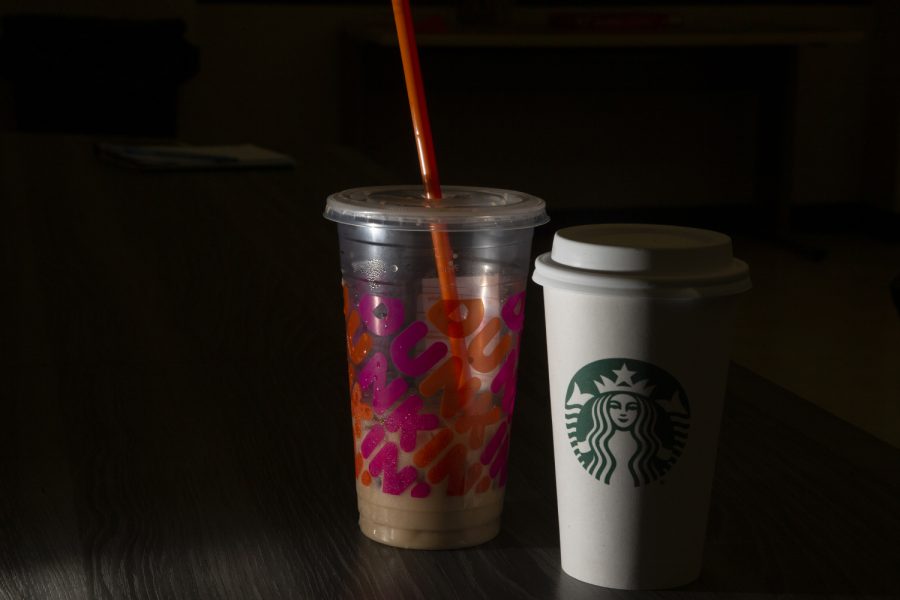I’m not sure if I’m writing this column because I want to scare myself into stopping, or if I’m writing it because I want to scare you into never starting.
Either way, here’s why your current or future caffeine addiction is a serious problem.
As I sit here writing my opinion on caffeine addictions in college students, I’m ironically sipping an energy drink — my guilty pleasure — to keep me awake.
I know I’m not alone. I can guarantee there are thousands of college students just like me right now at 7:45 p.m. — or whatever other late hour they’re up until to meet the academic and social demands of college. I haven’t walked to campus or been in any class where I didn’t see at least one student with an energy drink.
According to The National Library of Medicine, “Caffeine, in any form, was consumed by 92% of students in the past year.”
The more I drink caffeine every day, multiple times a day, the more I realize I might have an actual problem. The more I realize that, the more I realize I haven’t had a good night’s sleep in ages. And the more I realize that, the more I realize my mental health has never been worse since starting college — also known as the time I started religiously drinking caffeine.
Higher levels of anxiety and depressive symptoms, such as poor appetite, overeating, sleep disorders, and persistent depressed mood, are all telltale signs of chronic caffeine consumption.
What scares me the most is how little I know about what I’m putting into my body.
In July 2023, the Food and Drug administration looked into Prime Energy over health and safety concerns. Reportedly, one Prime Energy drink has as much caffeine as six cans of Coke.
Caffeine isn’t the only cause for concern. Energy drinks are overloaded with additives like artificial sweeteners, taurine, and L-theanine. These can all be found in a Prime Energy, making for a dangerous combination of heightened nervous system effects and higher risk for cardiovascular health concerns.
Artificial sweeteners act as a replacement for sugar, allowing companies to brand their products as “zero added sugar.” Like just about everything, any ingredient is OK in moderation. The same goes for taurine and L-theanine, which can both have positive side effects like regulating water and mineral balance in cells and improving mental focus and sleep quality.
That said, both chemical compounds are naturally occuring in the body. For chronic energy drink consumers, when these ingredients are paired with a stimulant, they can cause unknown side effects. Some might even experience a “backfire effect,” in which their reaction contradicts the reported benefits.
Because Prime provides limited information about the amount of taurine and L-theanine in its energy drink, consumers are left in the dark about their nutritional choices.
The consequences don’t end there. College students might consume heavy amounts of caffeine, but what do you think they’re consuming more? If you guessed alcohol, you’re probably correct.
I can’t tell you how many times I have witnessed students order multiple vodka Red Bulls at the bar, often two at a time.
This combination of alcohol and caffeine is a dangerous game.
Researchers at the University of Florida did a study on caffeine and alcohol mixed drinks. They found that out of the 800 students surveyed, those who consumed the combination of caffeine and alcohol were more intoxicated than those who didn’t consume caffeine. They were also four times more likely to want to drive home.
Consuming alcohol with caffeine leaves a heightened risk of alcohol poisoning, injuries, sleepless nights, and a higher level of impairment.
The risk of caffeine and alcohol mixed drinks aside, the chronic overdosage of energy drinks alone can result in poor sleep.
For college students, sleep is essential for growth and development. It aids recovery, wellness, and overall positive mental health. When we consume too much caffeine, it impacts our sleep, which in turn impacts virtually every aspect of our lives.
Frequent sleep deficiency can cause chronic health problems that influence the way we react, think, learn, and work.
Lack of sleep can also impact college students’ GPAs.
According to the Washington Post, “Researchers found that every lost hour of average nightly sleep at the start of an academic term was associated with a 0.07-point drop in a student’s end-of-term GPA.”
Now that I’ve scared myself so much into not sleeping, it’s important to remind everyone — and myself — that everything is OK in moderation. Healthy alternatives to energy drinks include matcha and green tea, kombucha, smoothies, and coconut water.
Making a minor adjustment from two or three energy drinks a day to one per day could be the difference between five hours of sleep and eight. It could also mean a 2.75 — the University of Iowa’s minimum GPA required for scholarship renewal — instead of a 2.68.
Don’t believe me? Try it for yourself.



